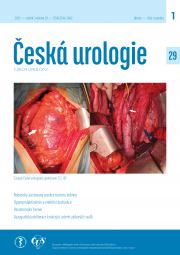Ces Urol 2004, 8(1):21-23 | DOI: 10.48095/cccu2004006
Has significance spontaneous familial screening of prostate cancer?
- Urologické oddelenie NsP Skalica
Introduction and purpose: Hereditary forms account for approximately 10 % of all prostate cancer (PC). The aim of this study was: to evaluate significance of positive familial history as risk factor of PC and efficiency of PC familial screening.
Material and methods: From January 1999 to December 2001 was detected 68 men (average age 65,8 years, range 52 - 81 years) with histologically proved PC. A occurence of PC was ascertained in a families retrospectivelly and prospectivelly. 207 "healthy" relatives men (aged 40 - 75 years) was examined (digital rectal examination, serum level of PSA, eventually prostate biopsy) prospectivelly. So - called familial PC is a detection at least two men with histological proved PC in a one family. Severe criteria of hereditary PC are showed in a table 2. Genetic analysis wasn´t made.
From January 1996 to December 1998 was sreened 196 men (not relatives, average age 61,5 years, range 51 - 74 years), who were admitted in hospital for non urological diseases. A incidence of PC in this group of men was statistically compared to a occurrence of PC in a familial screening.
Results: Familial PC was demonstrated by 12/ 8 (17,7 %) families and hereditary PC was screened by 2/68 (2,9 %) families. PC was detected significantly higher (p< 0, 01) in a family screening (4/207; 1,9 %) then by men without family relationship (2/196; 1 %). Metastatic PC wasn´t detected in a family screening at the time of diagnosis PC.
Conclusions: A screening of PG is still controversial. There are needed a genetic analysis of families with high risk of PC.
Keywords: prostate cancer (PC), family history, screening of relatives, hereditary prostate cancer
Published: January 1, 2004
References
- Key T. Risk factors for prostate cancer. In: Preventing prostate cancer: Screening versus chemoprevention. Cancer Surveys 1995; 23 (1): 63-67.
- Horňák M. Karcinóm prostaty: diagnostika, liečba a skríning. Konzílium 2002; 3 (2): 3-37.
- Paiss T, Herkommer K, Chab A. Das familiäre Prostatakarzinom in Deutschland. Urologe A 2002; 41 (1): 38-43.
 Go to original source...
Go to original source...  Go to PubMed...
Go to PubMed... - Morganti G, Gianferrari L, Cresseri A. Recherches clinico - statistiques et génétiques sur les néoplasies de la prostate. Acta Genet Stat Med. 1956; 6 (3): 304-305.
 Go to original source...
Go to original source... - Berry R, Schroeder J, French A. Evidence for a prostate cancer - susceptibility locus on chromosome 20. Am J Hum Genet 2000; 67 (1): 82-91.
 Go to original source...
Go to original source...  Go to PubMed...
Go to PubMed... - Carter B, Beaty T, Steinberg G. Mendelian inheritance of familial prostate cancer. Proc Natl Acad Sci. USA 1992; 89 (5): 3367-3371.
 Go to original source...
Go to original source... - Carter B, Bova G, Steinberg G. Hereditary prostate cancer: epidemiologic and clinical features. J. Urol, 1993; 150 (5): 797-802.
 Go to original source...
Go to original source...  Go to PubMed...
Go to PubMed... - Kliment J, Horňák M. Karcinóm prostaty. Martin, Osveta 1999: 297.
- Steinberg G, Carter B., Beaty T. Family history and the risk of prostate cancer. Prostate 1990;17 (4): 337-347.
 Go to original source...
Go to original source...  Go to PubMed...
Go to PubMed... - Berthon P, Valeri A., Cohen A. Predisposing gene for early - onset prostate cancer, localised on chromosome 1q42,2-43. Am J Hum Genet 1998; 62 (7): 1416-1424.
 Go to original source...
Go to original source...  Go to PubMed...
Go to PubMed... - Smith J, Freijle D, Carpten,J. Major susceptibility locus for prostate cancer on chromosome 1 suggested by a genome - wide search. Science 1996; 274 (6): 1371-1374.
 Go to original source...
Go to original source...  Go to PubMed...
Go to PubMed... - Suarez B, Lin J, Burmester J. A genome screen of multiplex sibships with prostate cancer. Am J Hum Genet 2000; 66 (4): 933-944.
 Go to original source...
Go to original source...  Go to PubMed...
Go to PubMed... - Tavtigian S, Simard J, Teng D. A candidate prostate cancer susceptibility gene at chromosome 17p. Nat Genet, 2001; 23 (1):172-180.
 Go to original source...
Go to original source... - Witte J, Goddard K, Conti D. Genomewide scan for prostate cancer - aggressiveness loci. Am J Hum Genet 2001; 67 (1): 92-99.
 Go to original source...
Go to original source...  Go to PubMed...
Go to PubMed... - Ernst T, Hergenhahn M, Kenzelmann M. Decrease and gain of gene expression are equally discriminatory markers for prostate carcinoma: A gene expression analysis on total and microdissected prostate tissue. Am J Pathol 2002; 160 (6): 2169-2180.
 Go to original source...
Go to original source...  Go to PubMed...
Go to PubMed... - Singh D, Febbo P, Ross K. Gene expression correlates of clinical prostate cancer behavior. Cancer Cel 2002; 17 (1): 203-209.
 Go to original source...
Go to original source... - Luo J, Yu Y, Cieply K. Gene expression analysis of prostate cancers. Mol Carcinog 2002; 33 (1): 25-35.
 Go to original source...
Go to original source...  Go to PubMed...
Go to PubMed... - Schaid D, Mc Donnell S, Blute M. Evidence for autosomal - dominant inheritance of prostate cancer. Am J Hum Genet 1998; 62 (7): 1425-1438.
 Go to original source...
Go to original source...  Go to PubMed...
Go to PubMed... - Xu J, Meyers D, Freile D. Evidence for a prostate cancer susceptibility locus on the X chromosome. Nat Genet 1998; 20 (1): 175-179.
 Go to original source...
Go to original source...  Go to PubMed...
Go to PubMed... - Horňák M. Skríning karcinómu prostaty: čo vieme a čo potrebujeme vedieť? Med Monitor 1998; 4 (1): 12-16.


